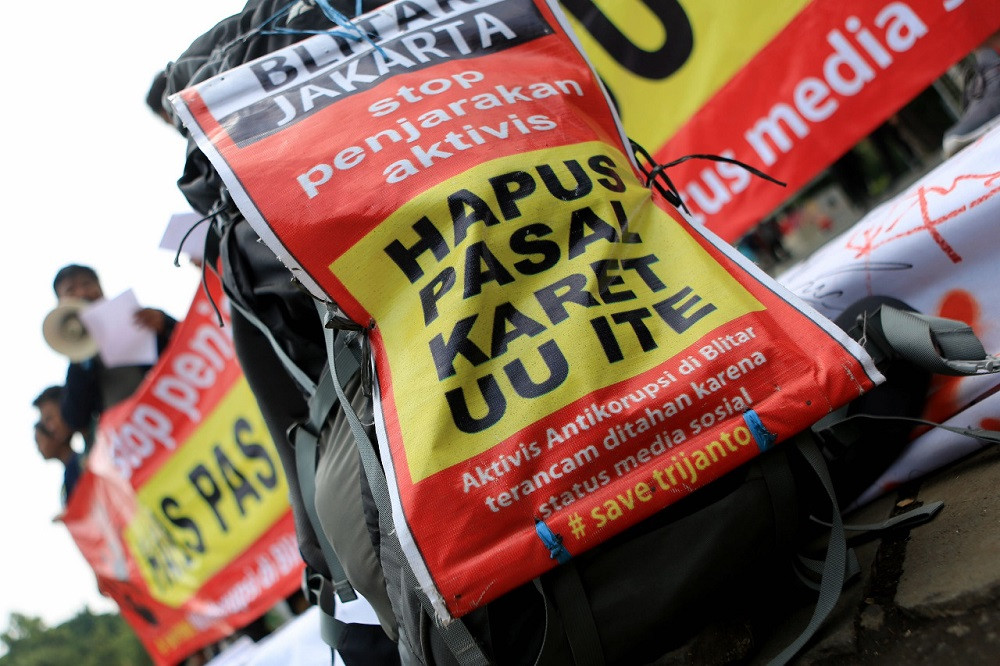Popular Reads
Top Results
Can't find what you're looking for?
View all search resultsPopular Reads
Top Results
Can't find what you're looking for?
View all search results[COMMENTARY] Creating a safe cyberspace for everyone
The real question is, how far-reaching do we need to revise the Electronic Information and Transactions (ITE) Law? The answer is, astronomically.
Change text size
Gift Premium Articles
to Anyone
T
o revise or not to revise the cyber law? Alas, that is not the question. The real question is, how far-reaching do we need to revise the Electronic Information and Transactions (ITE) Law? The answer is, astronomically.
The information technology landscape has changed vastly since 2016, when we last revised the ITE Law. We have learned now that the internet, particularly social media, is no longer safe as we become increasingly dependent on it in our daily lives. The cyber law, in its current iteration, has become inadequate to protect users against many forms of abuse. And some of the abuse, including widespread disinformation, has led to real-life injury and even deaths.
We welcome the government’s initiative to open a debate on whether to revise the law and which articles need revising. The final decision rests on the House of Representatives, but some political parties are apparently unconvinced that the law needs another review after only five years.
The police are to be commended for coming up with a set of new guidelines on using the ITE Law, following criticism by no less than President Joko “Jokowi” Widodo of their overboard tactics to invoke the legislation in prosecuting government critics.
The handful of arrests of government critics in the past few years has been enough to spook others. A survey by the National Commission on Human Rights published in January found that 36 percent of respondents said they were afraid of criticizing the government on internet and social media platforms. The level of fear is high, even among scholars.
But the police guideline on the ITE Law is a short-term measure. It is not only government critics who need protection. Regular internet users are falling prey to the growing risk of fraud, harassment and threats infiltrating the cyber ecosystem.
Disinformation is spreading at such a scale on social media that users are struggling to filter through the information to find any nugget they can trust. A case in point is the ongoing public confusion over COVID-19, its causes and treatments, and now the national vaccination program.
Sex predators are using social media to target their next prey, including children. Influencers are actively attacking certain users on their sponsors’ command. We have seen how social media has been used as a weapon for spreading hate and inciting violence to deadly effect, as in the last general elections in 2019.
Social media giants like Facebook, Twitter and Instagram may have built content moderation mechanisms to limit the potential harm to users. But doing this at scale is difficult, and many harmful posts and comments continue to slip through to appear on their platforms. Self-regulation is welcome, but it is not enough.
We need a strong and credible law that governs our behavior in cyberspace.
Legislation has always fallen behind the pace of technological advancements. In the case of information technology, given the rapid changes and developments, we are not talking about the law being a step or two out of date, but 10 steps or even more.
Revising the ITE Law must start with recognition of our ever growing reliance on the internet and the urgent need to create a safe cyberspace amid the surge in Indonesian internet users in just the last two years.
The law also needs a new name. Calling it “electronic information and transactions” is too narrow a definition. Commerce is certainly important, but the internet has grown beyond information and transactions. Giving the law a new name would widen its scope, which is exactly what we need to deal with all emerging as well as prevailing problems.
A tighter cyber law does not mean ceding more control to the government. The law must be clear in defining the rights it upholds and in apportioning responsibility to the different actors, from the telcos that provide the internet connection to internet service providers, online platforms and search engines, and to publishers, users and regulators.
So how do we make sure that the government does not abuse its power in regulating internet use?
The revised law should mandate the establishment of an independent oversight body to ensure the compliance of all parties. We have the Press Council and the Broadcasting Commission – both independent and paid for by the state – to oversee these public service sectors, which is a compelling argument for having an internet oversight body that is free from political and corporate interests.
The revised internet legislation must guarantee our civil freedoms, particularly freedom of expression, in a way that internet use does not lead to violating the human rights of others. Drafters of the law revision can refer to the International Covenant on Civil and Political Rights and other international rights laws in ensuring that both the public voice and public safety are protected together.
With better legislation, we can make the internet a safe place for everyone.
***
A journalist at The Jakarta Post, and a member of the independent Facebook Oversight Board. The views expressed are his own.










